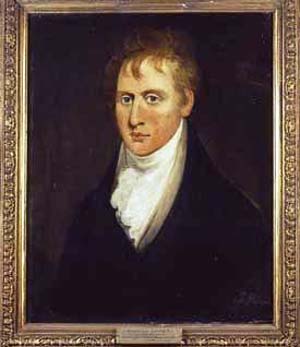Bold Robert Emmet: historical notes
Robert Emmet was probably the most charismatic of the Society of United Irishmen.
After his insurrection failed, he could possibly have escaped, but decided to visit his sweetheart Sarah Cullan in Harold’s Cross and was arrested there
by Jerry O’Reilly
The Clare Festival of Traditional Singing
The United Irishmen rise. Robert Emmet’s attempt at insurrection in Dublin on the 23rd of July 1803 was the final throw of the dice for the United Irishmen. It lasted a mere few hours, and his band of followers quickly degenerated into a mob, or several mobs.
These roamed the south inner city in groups of up to 300 for some time and had several bloody encounters with the military before they were finally dispersed.
In Thomas Street at about 9.00pm one group stopped a coach which was found to contain Lord Kilwarden, the Chief Justice, and his daughter and nephew. The mob dragged out the two men and murdered them. Cruikshank’s depiction of this incident appears on page 142.
On hearing of the killings Emmet went to the scene and arranged to place Miss Wolfe, Lord Kilwarden’s daughter, in a place of safety.
Capture and trial
Then, seeing that his plans had come to nothing, he headed south from the city, apparently to prevent contingents of rebels with whom he had contact coming to join the action in Dublin.
Emmet was soon taken and on the 19th of September was tried for high treason, found guilty and executed the following day in front of St. Catherine’s church in Thomas Street.
Just across the road from the Marshalsea Lane headquarters and not far from the scene of Lord Kilwarden’s murder, Robert Emmet was sentenced to be hanged, drawn and quartered.
Execution
In the event he was hanged until apparently dead, and then cut down and beheaded with a knife.
The executioner, probably Tom Galvin the public executioner of the day, then paraded up and down the platform holding the head up for the crowd to see and calling out, “This is the head of a traitor.”
These events are closer than they seem. A neighbour of mine, the late Padraig Breathnach, met in his youth a person who had witnessed the execution as a child.
The song
The song is undoubtedly the most popular of all songs connected with Emmet. It appeared on broadsides from around 1900 on and, according to Colm O Lochlainn became a very popular item with Dublin ballad sellers. The song is sometimes attributed to Tom Maguire, the IRA guerilla leader during the War of Independence.
As a schoolchild I learned all about Emmet the patriot and hero. My aunt used to recite his ‘A Speech From The Dock’ as a party piece, and I passed the place of his execution regularly.
Having been led to believe that his execution was the only one that resulted from the rising, it came as something of a shock to learn about the others who had been executed for their part in his adventure, but whose names never made it into the history books, probably because they were all just tradesmen.
Commemoration plaque

Plaque: (appendix 1, below)
Men Hanged in 1803 Rising
Some years ago the Dublin History Workshop placed a plaque on the wall of St. Catherine’s in Thomas Street to commemorate these men. Here, for the record, are the names:
Carpenters
Edward Kearney, John Killeen, Thomas Keenan, John Hayes, Michael Kelly, Henry Howley and John McIntosh;
Tailors
Owen Kirwan and John Begg;
Factory workers
Thomas Donnelly and Nicholas Tyrrell;
Slater
Maxwell Roach;
Coal Factor
Denis Lambert Redmond;
Shoemaker
John McCann;
Farm labourer
Felix Rourke;
Baker
James Byrne
Taken from ‘The Age of Revolution in the Irish Song Tradition 1776 to 1815’ by Terry Moylan and published by Lilliput Press, Dublin, in 2000Emmet’s speech
Emmet’s speech from the dock is possibly one of the most famous pieces of rhetoric in Irish history and is still freely quoted today 205 years after his death, particularly the final sentences.
“Let no man write my epitaph:
for as no man who knows my motives
dare now vindicate them.
Let not prejudice or ignorance asperse them.
Let them and me repose in obscurity and peace,
and my tomb remain uninscribed,
until other times, and other men,
can do justice to my character;
when my country takes her place
among the nations of the earth,
then, and not till then,
let my epitaph be written.
I have done.”
Full Text: (appendix 2, below)
Robert Emmet’s grave, a mystery

Sadly his grave remained uninscribed and when the time came to inscribe his grave it could not be found.
For some time it was thought that his remains were interred in St. Werburgh’s in Werburgh Street but this was disproved and it was then thought they were in Glasnevin Graveyard.
Research conducted in 2003 on the Bi-Centenary of his death by Sean Murphy, has however put forward the theory that he is buried in either St Paul’s in North King Street or in St. Peter’s in Aungier Street with neither place being able to be proved or disproved conclusively.
It will remain one of the great historical mysteries of Ireland.
Jerry O’Reilly
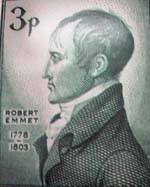
Robert Emmet
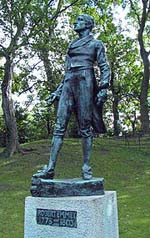
Statue of Robert Emmet, St Stephen’s Green, Dublin
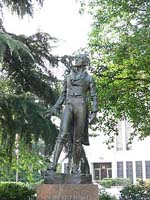
Monument of Robert Emmet, Embassy Row, Washington, USA
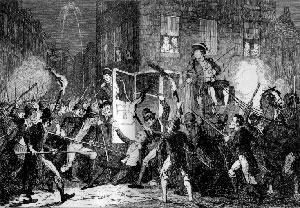
Murder of Lord Kilwarden at Robert Emmet’s Revolt
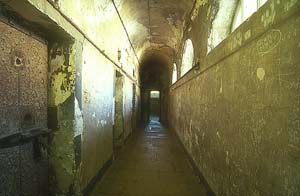
Corridor in Kilmainham prison
“Let no man write my epitaph:
for as no man who knows my motives
dare now vindicate them.
Let not prejudice or ignorance
asperse them.
Let them and me repose
in obscurity and peace,
and my tomb remain uninscribed,
until other times, and other men,
can do justice to my character;
when my country
takes her place among
the nations of the earth,
then, and not till then,
let my epitaph be written.
I have done.”
Full text: (appendix 2, below)

Emmet’s Monument in Thomas Street by St Catherine’s Church
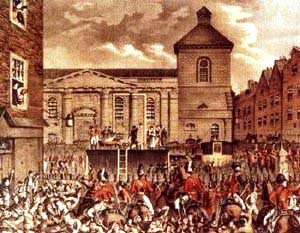
Emmet’s execution
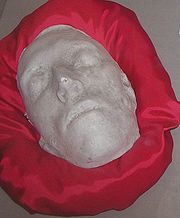
Robert Emmet’s death mask

Robert Emmet’s roadside plaque in Dublin
Plaque: (appendix 1, below)
Men Hanged in 1803 Rising

Plaque Naming Men Hanged in 1803 Rising
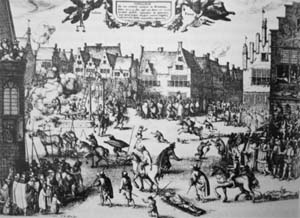
Hung drawn and quartered
|
|
|
|
Appendix 1:
|
Some years ago the Dublin History Workshop placed a plaque on the wall of St. Catherine’s in Thomas Street to commemorate these men. Here, for the record, are the names: CarpentersEdward Kearney, John Killeen, Thomas Keenan, John Hayes, Michael Kelly, Henry Howley and John McIntosh; TailorsOwen Kirwan and John Begg; Factory workersThomas Donnelly and Nicholas Tyrrell; SlaterMaxwell Roach; Coal FactorDenis Lambert Redmond; ShoemakerJohn McCann; Farm labourerFelix Rourke; BakerJames Byrne |
Appendix 2:
Full text of Emmet’s speech
“My Lords:
What have I to say why sentence of death should not be pronounced on me according to law?
I have nothing to say that can alter your predetermination, nor that it will become me to say
with any view to the mitigation of that sentence which you are here to pronounce, and I must abide by.
But I have that to say which interests me more than life, and which you have laboured
(as was necessarily your office in the present circumstances of this oppressed country) to destroy.
I have much to say why my reputation should be rescued from the load of false accusation and calumny
which has been heaped upon it. I do not imagine that, seated where you are,
your minds can be so free from impurity as to receive the least impression from what I am going to utter -
I have no hopes that I can anchor my character in the breast of a court constituted and trammeled as this is -
I only wish, and it is the utmost I expect,
that your lordships may suffer it to float down your memories untainted by the foul breath of prejudice,
until it finds some more hospitable harbour to shelter it from the storm by which it is at present buffeted.
Was I only to suffer death after being adjudged guilty by your tribunal,
I should bow in silence and meet the fate that awaits me without a murmur;
but the sentence of law which delivers my body to the executioner will, through the ministry of that law,
labour in its own vindication to consign my character to obloquy -
for there must be guilt somewhere: whether in the sentence of the court in the catastrophe,
posterity must determine.
A man in my situation, my lords, has not only to encounter the difficulties of fortune.
and the force of power over minds which it has corrupted or subjugated.
but the difficulties of established prejudice: the man dies, but his memory lives.
That mine may not perish, that it may live in the respect of my countrymen,
I seize upon this opportunity to vindicate myself from some of the charges alleged against me.
When my spirit shall be wafted to a more friendly port; when my shade shall have joined
the bands of those martyred heroes who have shed their blood on the scaffold and in the field,
in defence of their country and of virtue.
This is my hope: I wish that my memory and name may animate those who survive me,
while I look down with complacency on the destruction of that perfidious government
which upholds its domination by blasphemy of the Most High-which displays its power over man
as over the beasts of the forest-which sets man upon his brother,
and lifts his hand in the name of God against the throat of his fellow
who believes or doubts a little more or a little less than the government standard -
a government which is steeled to barbarity by the cries of the orphans
and the tears of the widows which it has made.
[Interruption by the court]
I appeal to the immaculate God -- I swear by the throne of heaven,
before which I must shortly appear - by the blood of the murdered patriots who have gone before me
that my conduct has been through all this peril and all my purposes governed
only by the convictions which I have uttered, and by no other view than that of their cure,
and the emancipation of my country from the superinhuman oppression
under which she has so long and too patiently travailed;
and that I confidently and assuredly hope that, wild and chimerical as it may appear,
there is still union and strength in Ireland to accomplish this noble enterprise.
of this I speak with the confidence of intimate knowledge,
and with the consolation that appertains to that confidence.
Think not, my lords, I say this for the petty gratification of giving you a transitory uneasiness;
a man who never yet raised his voice to assert a lie will not hazard his character with posterity
by asserting a falsehood on a subject so important to his country, and on an occasion like this.
Yes. my lords. a man who does not wish to have his epitaph written
until his country is liberated will not leave a weapon in the power of envy,
nor a pretense to impeach the probity which he means to preserve even in the grave to which tyranny consigns him.
[Interruption by the court]
Again I say, that what I have spoken was not intended for your lordship,
whose situation I commiserate rather than envy-my expressions were for my countrymen;
if there is a true Irishman present. let my last words cheer him in the hour of his affliction.
[Interruption by the court]
I have always understood it to be the duty of a judge.
when a prisoner has been convicted, to pronounce the sentence of the law;
I have also understood that judges sometimes think it their duty to hear with patience and to speak with humanity.
to exhort the victim of the laws. and to offer with tender benignity
his opinions of the motives by which he was actuated in the crime,
of which he had been adjudged guilty: that a judge has thought it his duty so to have done.
I have no doubt -- but where is the boasted freedom of your institutions.
where is the vaunted impartiality, clemency. and mildness of your courts of justice,
if an unfortunate prisoner, whom your policy, and not pure justice.
Is about to deliver into the hands of the executioner.
is not suffered to explain his motives sincerely and truly.
And to vindicate the principles by which he was actuated?
My lords,
it may be a part of the system of angry justice,
to bow a man's mind by humiliation to the purposed ignominy of the scaffold;
but worse to me than the purposed shame, or the scaffold's terrors,
would be the shame of such unfounded imputations as have been laid against me in this court:
you, my lord [Lord Norbury], are a judge. I am the supposed culprit;
I am a maemy should enter only by passing over my lifeless corpse.
Am I, who lived but for my country, and who have subjected myself
to the dangers of the jealous and watchful oppressor, and the bondage of the grave,
only to give my countrymen their rights, and my country her independence,
and am I to be loaded with calumny and not suffered to resent or repel it- no, God forbid!
If the spirits of the illustrious dead participate in the concerns and cares
of those who are dear to them in this transitory life -
oh, ever dear and venerated shade of my departed father.
look down with scrutiny upon the conduct of your suffering son;
and see if I have even for a moment deviated from those principles of morality and patriotism
which it was your care to instill into my youthful mind, and for which I am now to offer up my life!
My lords,
you are impatient for the sacrifice-the blood which you seek
is not congealed by the artificial terrors which surround your victim;
it circulates warmly and unruffled, through the channels which God created for noble purposes.
but which you are bent to destroy. for purposes so grievous. that they cry to heaven.
Be yet patient! I have but a few words more to say.
I am going to my cold and silent grave:
my lamp of life is nearly extinguished: my race is run:
the grave opens to receive me,
and I sink into its bosom!
I have but one request to ask at my departure from this world -
it is the charity of its silence!
Let no man write my epitaph:
for as no man who knows my motives dare now vindicate them.
let not prejudice or ignorance asperse them.
Let them and me repose in obscurity and peace,
and my tomb remain uninscribed,
until other times, and other men,
can do justice to my character;
when my country takes her place among the nations of the earth,
then, and not till then, let my epitaph be written.
I have done”
Folk Leads Publications 2008
